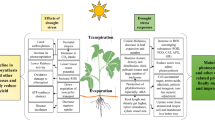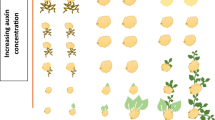Summary
Arabidopsis seeds were sown aseptically on mineral media containing between 0 and 90% of heavy water (D2O). Initially, a D2O level of over 50% was lethal for the plants. However, after culture for six successive generations on 50% D2O, plants were capable of growing marginally on media containing up to 70% D2O, but not higher. With increasing concentration, deuterium progressively delays germination, slows growth, reduces survival, results in bleaching of the leaves and delays flowering. Pollen fertility is not affected measurably but seed set is reduced with increasing levels of deuteration so that at 70% D2O few seeds were obtained. The viability of the seeds harvested from plants grown on deuterated media is low. No chlorophyll or morphological mutants were observed among a large number of plant progenies. Seeds from plants cultured on D2O media for several generations grow normally on proteated media in the very first generation.
Similar content being viewed by others
References
Brown, J. A. M., and H. H. Smith: Incorporation and effects of thymidine analogues in gametophytic tissue of Arabidopsis thaliana. Mutation Res. 1, 45–53 (1964).
De Giovanni, R., and S. Zamenhof: The effects of deuterium oxide (D2O) on Escherichia coli. Records Genet. Soc. Amer. 28, 65 (1959).
Flaumenhaft, E., S. Bose, H. L. Crespi, and J. J. Katz: Deuterium isotope effects in cytology. Int. Rev. Cytol. 18, 313–361 (1965).
Gross, P. R., and W. Spindel: The inhibition of mitosis by deuterium. Ann. N. Y. Acad. Sci. 84, 745–754 (1960).
Hughes, A. M., E. L. Bennet, and M. Calvin: Further studies on sterility produced in male mice by deuterium oxide. Ann. N.Y. Acad. Sci. 84, 763–769 (1960).
—, P. E. Hildreth, and G. C. Becker: Genetic effects of deuterium oxide in Drosophila melanogaster. Genetics 49, 715–724 (1964).
Katz, J. J., and H. L. Crespi: Deuterated organisms: cultivation and uses. Science 151, 1187–1194 (1966).
Konrad, M.: The mutagenic effect of D2O on bacteriophage T4. Ann. N.Y. Acad. Sci. 84, 678–684 (1960).
Lewis, G. N.: Heavy water prevents seeds from sprouting. Sci. News Letter 24, 116 (1933).
Martin, C., and H. Ephrussi-Taylor: Effects of partial deuteration on transforming DNA of Pneumococcus. Biochim. biophys. Acta (Amst.) 80, 411–421 (1964).
O'Brien, R. T.: Effect of D2O on uptake in yeast. Proc. Soc. Exp. Biol. (N. Y.) 117, 555–558 (1964).
Thomson, J. F.: Biological effects of deuterium. New York: Macmillan 1963.
Zamenhof, S., and M. Demerec: Studies on induction of mutations by chemicals. I. Experiments with heavy water (deuterium oxide). Amer. Naturalist 77, 380–384 (1943).
Author information
Authors and Affiliations
Rights and permissions
About this article
Cite this article
Bhatia, C.R., Smith, H.H. Adaptation and growth response of Arabidopsis thaliana to deuterium. Planta 80, 176–184 (1968). https://doi.org/10.1007/BF00385593
Received:
Issue Date:
DOI: https://doi.org/10.1007/BF00385593




